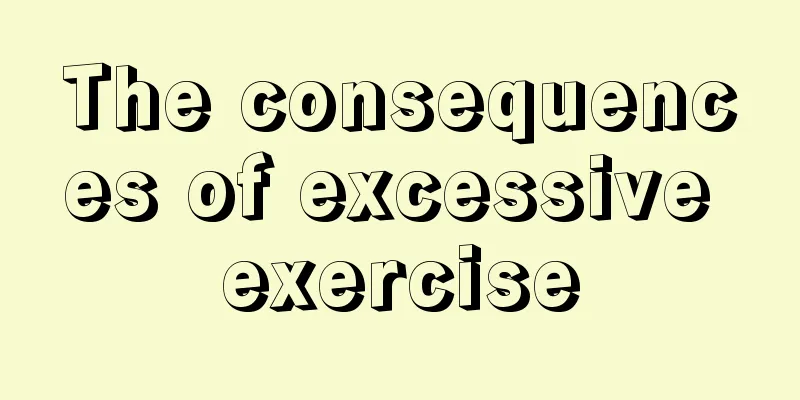Take stock of things you shouldn't do after exercise, be careful of body "poisoning"

|
Exercise is a very good way to exercise the body. Exercise can excrete toxins from the body, relax your mood and reduce stress. However, exercise is not a simple thing. Have you noticed the many precautions after exercise? Do you have any of the 4 major misunderstandings after exercise? Do you know about nutritional supplements for exercise? Let's find out with the editor below. Many people like to drink a lot of water after exercise and sit on the ground to rest for a while. This is a wrong behavior and it is very harmful to our health. Myth 1: Drinking a lot of water after exercise Sweating during exercise will cause the body to lose water and electrolytes. Proper hydration is beneficial for maintaining fluid balance and helps promote body recovery. However, if you drink a lot of water, it may cause "water poisoning", with symptoms such as dizziness, vomiting, weakness, rapid heartbeat, and in severe cases, muscle spasms. In addition, if the water temperature is too low, it can cause gastrointestinal discomfort and abdominal pain. For people who exercise for a long time, it is recommended to drink small amounts of sports drinks before, during and after exercise, and keep the water temperature at 10℃~20℃. If you engage in exercise that requires a lot of physical exertion, you should replenish yourself with drinks containing oligosaccharides and peptides within 2 hours after the exercise. This will help the body's resynthesis of muscle glycogen and aid in fatigue recovery. Myth 2: Lie down or squat immediately after exercise After exercise, the body's functions remain active for a certain period of time, and it takes a certain amount of time for the functions of each system to recover. During strenuous exercise, a large number of capillaries in the lower limbs expand, and blood flow can reach more than 25 times that of resting state. The lower limb muscles continuously contract, promoting blood return through the action of "muscle pump". If you lie down or squat immediately after exercise, the muscle pump effect disappears and the amount of blood returning to the heart drops sharply, making you prone to dizziness, blurred vision, or even fainting. Therefore, it is recommended not to stop immediately after exercise. It is best to do some relaxation, tidying up or stretching exercises. You can also massage your muscles to promote fatigue recovery. Myth 3: Take a shower right after exercise After exercise, a lot of sweat is produced, the body temperature rises, and the skin takes away a lot of water. If you take a shower immediately after exercise, especially when the water is cold, the sweat glands will stop secreting sweat, and the heat will not be able to dissipate. This is not good for the body's recovery and may even cause muscle cramps, reduce immune function, and trigger diseases such as colds, flu, and bronchitis. It is recommended to wipe off sweat after strenuous exercise, avoid using electric fans or entering a very cold air-conditioned room, and wait until you stop sweating before taking a shower. Myth 4: Eating Blindly After Exercise During exercise, the motor central nervous system is in an excited state, the body's parasympathetic nervous system is relatively inhibited, the excitability of the digestive system is significantly reduced, gastrointestinal motility is weakened, and the secretion of various digestive glands is greatly reduced. The normal secretion of each digestive gland needs 20 to 30 minutes to recover after exercise, so it is recommended to take a short rest before eating after exercise. Generally speaking, active rest (i.e. relaxation, tidying up, and stretching) after exercise is more helpful in promoting fatigue recovery than passive rest (such as sitting or lying down to rest). It is best to choose different rest methods for different exercises, which can help the heart and muscles quickly eliminate fatigue. For example, when riding a bicycle, the back remains arched for a long time, which can easily cause fatigue and soreness in the back and arms. After exercise, you can massage tired parts of your waist and legs, or practice some yoga moves to stretch your waist to relax your muscles. After running, you should do some leg stretching exercises to reduce muscle soreness and joint injuries. You can also take a tennis ball and roll it from the ankle to the back of the knee, and massage the painful area several times. How to replenish nutrition in time after exercise carbohydrate The human body needs carbohydrates as fuel before exercise, so they are essential in the training of athletes. Bread, rice, cereals, pasta, fruits and vegetables provide high-energy fuel for muscles and can speed up the restocking of muscle fuel after exercise. If you don't eat enough carbohydrates, you will become tired more easily. The exact amount of carbohydrates needed depends on individual training and personal requirements. For athletes who train intensively, the daily carbohydrate requirement is 6 to 10 grams per kilogram of body weight. For example, if an athlete weighing 60 kg trains 2 to 4 hours a day, he will need approximately 360 to 600 grams of carbohydrates per day. Highly effective hydrating beverage Drinks are essential to getting a good workout. During periods of high intensity activity, reduced fluid intake increases the likelihood of heat cramps, heat exhaustion, or heat stroke. Drink before, during and after your workout and make it part of your exercise regimen. Make it a habit to drink plenty of fluids, even on days when you don't exercise. Water, sports drinks, fruit and vegetable juices, or mineral water are all good choices. It is recommended to drink cold water or sports drinks during exercise, training and competition. Alcohol and caffeine are dehydrating and therefore do not count as hydrating drinks. Drink 400ml to 600ml of beverage 2 hours before exercise, and drink 150ml to 350ml every 15 to 20 minutes during exercise Schedule your meals If you are about to participate in a running race or other competition, you should have a low-fat, high-carbohydrate meal two to three hours before the race. Eat foods that are familiar to you and easy to digest. Fruit, yogurt, a bagel, or a bowl of cereal are all good choices. If you have food in your stomach during exercise, blood flow is redirected from your digestive tract to your working muscles, causing stomach cramps and a bloated feeling. If you exercise on an empty stomach in the morning, you need to have enough energy stored up the day before to sustain a 60- to 90-minute workout. If you find it difficult to eat breakfast before a morning workout, have a carbohydrate-rich snack before going to bed the night before. If you exercise later in the day and it has been more than four hours since your last meal, you should have a snack 45 to 60 minutes before your workout. Your food choices and preferences may vary depending on when you exercise, what sport you play, and how intensely you exercise. You will soon learn which food combinations are best for you Replenishment and recovery After a workout, it's important to replenish the glycogen in your muscles. A carbohydrate-rich meal or snack should be consumed within 30 minutes of exercise. At this time, the human body's muscles are most easily able to absorb the carbohydrates consumed. If you're participating in two or more activities in one day, it's especially important to eat something rich in carbohydrates within 1 to 4 hours after a heavy workout. Foods like bagels, fruit, and cereal are easy to eat. If you don't have an appetite for solid foods, juices and sports drinks are ideal sources of carbohydrates immediately after a workout. They also help keep you hydrated. Replace lost sodium and potassium Both of these elements lost during exercise can be replenished through food. Eat fruits and vegetables rich in potassium, such as bananas, oranges, melons and tomatoes. Adding a little salt to your diet after exercise can help replace the sodium lost through sweating. Vitamins and minerals Physical activity may increase the body's need for certain vitamins and minerals. However, if you are consuming enough calories to meet the requirements of physical activity, and those calories come from nutritious foods, then you probably don't need to take any supplements. Nutritional supplements cannot give you extra energy unless you are already lacking a certain nutrient to begin with. |
<<: Do you really know how to use the "carving knife" of muscles?
>>: After doing yoga, you will find this "terrible" change
Recommend
Is it good to train your abdominal muscles every day?
Is it good if we do abdominal muscle exercises ev...
How to improve arm explosiveness?
For athletes, especially weightlifters, arm explo...
What are the benefits of doing push-ups?
Push-ups are not unfamiliar to everyone. Everyone...
How to quickly increase lung capacity
We all know that vital capacity is the simplest w...
How can I lose belly fat?
Miniskirts are the favorite clothes of many girls...
What does aerobic exercise mean?
Nowadays, there are more and more obese people. I...
Why do male gymnasts have strong muscles?
We can usually see gymnastics on TV. In gymnastic...
What are the benefits of extreme sports?
Extreme sports is an emerging sport that is parti...
How to practice skipping rope
When we first started physical education class, w...
Can you lose weight without exercise?
Many obese women want to achieve the goal of losi...
How to do dumbbell double-arm rowing?
Rowing is a popular back training exercise. In or...
What are the dietary considerations for fitness?
It is a common perception that people who exercis...
How to warm up before yoga
Yoga is a relatively convenient sport for us to e...
Basketball skills
Basketball is a common sport in our daily life. P...
What should we pay attention to in physical recovery training?
Some people may be too busy with work to exercise...









